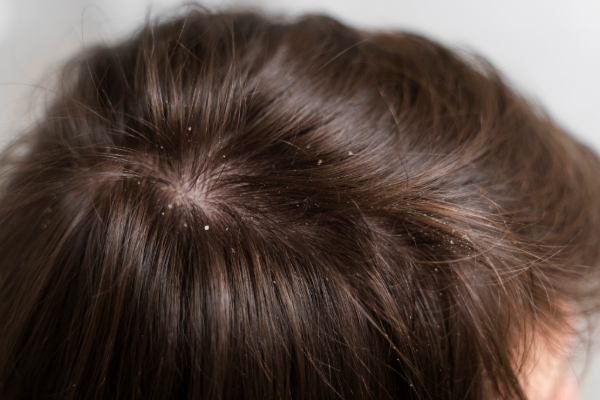02 May 2025
Scalp Psoriasis vs Dandruff: How to Tell the Difference (And What to Do About It)
Summary
Flakes, itching and discomfort are common to both dandruff and scalp psoriasis - but the causes and treatments are very different. Dandruff is usually triggered by oil imbalance, product build-up or a yeast overgrowth, while scalp psoriasis is an autoimmune condition that causes thick, scaly patches and inflammation.
If you're unsure which one you're dealing with, professional support can make all the difference. At Hove Hair Clinic, we offer expert guidance and tailored treatments to help calm your scalp and restore comfort.
If you've ever caught yourself brushing off flakes and quietly wondering, “Is this just dandruff… or something more?” you’re not alone. It’s one of the most common questions we hear from clients at Hove Hair Clinic, and it’s a good one.
Dandruff and scalp psoriasis can both cause flakes, itching and discomfort - but that’s where the similarities end. Understanding which condition you’re dealing with is the first step to treating your scalp effectively.
Let’s explore the key differences between the two, what causes them and how to get the right kind of help:
What is Dandruff?
Dandruff is a common scalp condition that causes flaking and mild irritation. It’s usually the result of an overgrowth of a yeast-like fungus called Malassezia, which naturally lives on the skin. In some people, this fungus triggers inflammation, leading to flaking.
Other times, dandruff is caused by an imbalance in the scalp's natural oils - either producing too much or too little, or by product build-up from shampoos, conditioners and styling products.
Common triggers:
Stress: Hormonal changes and tension can disrupt your skin’s balance.
Weather changes: Cold, dry air or humid conditions can irritate the scalp.
Harsh or unsuitable hair products: Especially those with drying alcohols or heavy silicones.
Infrequent washing: This can lead to excess oil and product build-up.
Over-washing: Which strips the scalp and may lead to rebound oiliness.
Signs of dandruff:
Fine, white or yellow flakes
Oily or greasy scalp
Flakes are loose and easy to brush out
Mild to moderate itching
Scalp not usually sore or inflamed
Dandruff is generally manageable with the right products and consistent scalp care. But if your flakes seem stubborn or symptoms worsen, it may be time to look at other methods of treating dandruff and an itchy scalp.
What is Scalp Psoriasis?
Scalp psoriasis is an autoimmune condition. Unlike dandruff, it’s not caused by yeast or oil imbalance - instead, the immune system speeds up the skin cell renewal cycle. This causes skin cells to pile up on the surface, leading to thick, scaly patches, and in some cases, hair loss.
It can be hereditary and may flare up in cycles - often worsened by stress, cold weather, infections, or certain medications.
Scalp psoriasis symptoms include:
Thick, silvery-white scales
Red, raised, and inflamed skin underneath
Flakes that stick to the scalp and are harder to remove
Itching that may be intense
Burning or soreness
May extend beyond the scalp (e.g., behind the ears, on the neck, forehead or even other parts of the body like elbows or knees)
Psoriasis can have a more significant impact on day-to-day life, especially when flare-ups are frequent or uncomfortable. The sooner it’s identified, the sooner you can start psoriasis treatment, in a way that calms and soothes, not strips and irritates.
How to Tell the Difference: At a Glance
Clue | Dandruff | Scalp Psoriasis |
Flake type | Fine, white/yellow, loose | Thick, dry, silvery, stuck-on |
Scalp appearance | Normal or slightly oily | Red, raised, inflamed patches |
Itching | Mild to moderate | Often intense, may burn or sting |
Spread | Limited to the scalp | May go beyond hairline or appear on other body parts |
Underlying cause | Yeast, oil imbalance, build-up | Autoimmune condition, genetic component |
When to Seek Help for Your Scalp Condition
If you’ve tried over-the-counter anti-dandruff shampoos or scalp treatments and the flakes keep coming back or if the itching is severe and your scalp feels sore, it’s time to speak to a professional.
Getting the right diagnosis can save you time, money, and a whole lot of frustration. A scalp that’s inflamed or uncomfortable shouldn’t be ignored, especially if you're unsure what’s behind the symptoms.
How We Can Help
At Hove Hair Clinic, we’ve seen it all, from stubborn dandruff that just won’t budge to long-term psoriasis flare-ups that impact confidence and quality of life. We approach every scalp with sensitivity, experience, and a personalised plan.
Here’s what we offer:
Tailored in-clinic treatments – our hair and scalp treatments are designed to calm irritation and support healing.
Home-use solutions Xderma kit is great for itchy scalps or light dandruff, Xfolate kit is for more severe dandruff or psoriasis.
Expert advice and ongoing support – because your scalp health journey doesn’t end after one appointment.
A safe, judgement-free space to ask questions, share concerns and feel heard.
It’s easy to confuse dandruff with scalp psoriasis — especially when flakes are the first thing you notice. But tuning into the type of flake, how your scalp feels, and whether symptoms spread beyond your hairline can offer valuable clues.
And remember, you don’t have to figure it out alone.
If you’re looking for more personalised advice or professional hair and scalp treatments, reach out to us at Hove Hair Clinic on 01273 711140. Whether it’s dandruff, psoriasis, or something in between, we’ll work with you to find the gentlest, most effective path forward.
